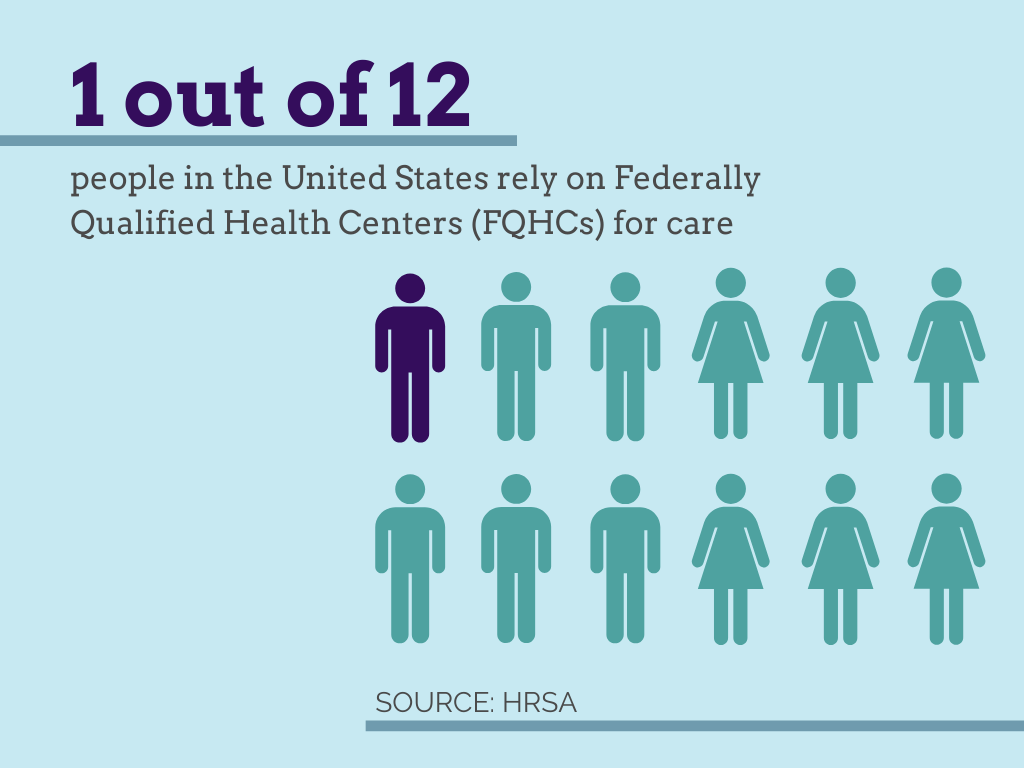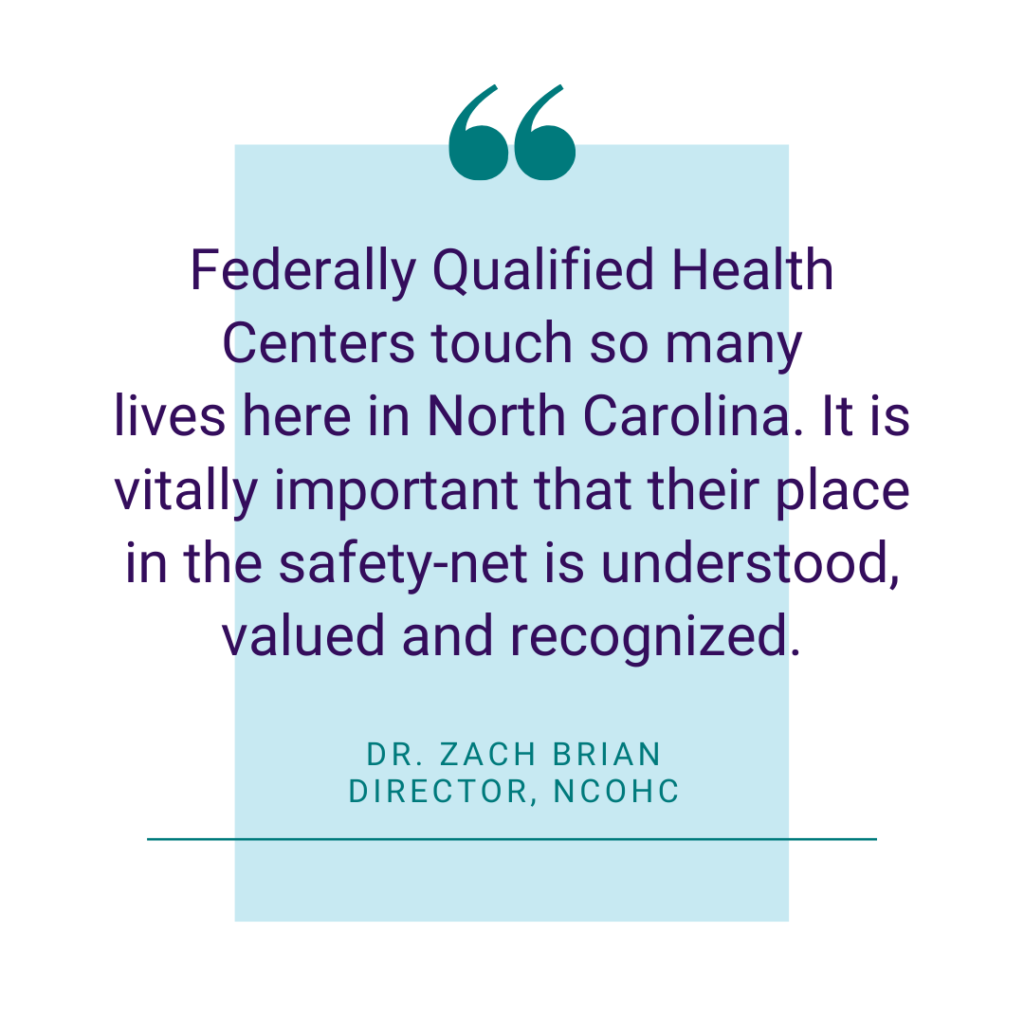It’s one of the most common questions in public health and the source of significant confusion in matters of health policy: what is a Federally Qualified Health Center?
Federally Qualified Health Centers, otherwise known as FQHCs, play an integral role in providing access to health care (including oral health care) in North Carolina and throughout the United States.
In this blog post, we will examine Federally Qualified Health Centers— what they are, how they are defined by the U.S. Health Resources and Services Administration (HRSA), and how they function as one of the most integral components of the dental safety net.
What is a Federally Qualified Health Center?
Federally Qualified Health Centers (FQHCs) are defined under federal laws governing Medicare and Medicaid. In the simplest terms, FQHCs are public health centers focused on serving at-risk and underserved populations. They offer access to comprehensive care regardless of a patient’s ability to pay and qualify for federal “Section 330” grants under the Public Health Service Act.
According to HRSA, FQHCs can take many forms, “including community health centers, migrant health centers, health care for the homeless health centers, public housing primary care centers, and health center program ‘look-alikes.’ They also include outpatient health programs or facilities operated by a tribe or tribal organization or by an urban Indian organization.”
Although not technically federal programs, FQHCs are subject to criteria and rules established by the federal government and effectively function as a hybrid between a state and federal entity.
A more detailed explanation of what defines an FQHC is provided by HRSA. A full summary of HRSA criteria for FQHCs can be found on FQHC.org.
As defined by HRSA, FQHCs must:
- Qualify for funding under Section 330 of the Public Health Service Act (PHS)
- Qualify for enhanced reimbursement from Medicare and Medicaid, as well as other benefits
- Serve an underserved area or population
- Qualify for federal malpractice insurance under the Federal Tort Claims Act (FTCA) for its providers and contractors.*
- Offer a sliding fee scale
- Provide comprehensive health care services (either on-site or through arrangement with another provider), including:
- Preventive health services
- Dental services
- Mental health and substance abuse services
- Transportation services necessary for adequate patient care
- Hospital and specialty care
- Have an ongoing quality assurance program
- Have a governing board of directors
*Under the FTCA, health center employees and contractors are deemed to be federal employees.
The Impact of FQHCs on Health Care Access in the U.S.
FQHCs comprise a vital part of the “safety-net,” providing access to health care (including oral health care) for at-risk and underserved areas and populations.
As of July 2019, there were 1,368 Federally Qualified Health Centers in the United States. When combined with FQHC “look-alikes” ¬— organizations that meet the criteria for FQHCs but do not yet receive grant funding under Section 330 — and service sites, that number rises to more than 14,200.
FQHCs’ impact on access to health care for underserved populations is significant: according to HRSA, 1 in 12 people in the United States rely on FQHCs for care.
As reported by HRSA, the 28 million people served nationally by FQHCs include:
- 1 in 9 children
- 1 in 5 rural residents
- 1 in 3 people living in poverty
- More than 385,000 veterans
Between 2000 and 2018, the number of patients served by FQHCs increased 196 percent.

The Importance of FQHCs in North Carolina
FQHCs also play an integral role in providing care to North Carolina’s underserved areas and populations. According to a report by Dr. Pam Silberman, professor at the University of North Carolina’s Gillings School of Global Public Health, as of 2017 there were 41 FQHCs with 216 service sites in North Carolina.
Together, these North Carolina FQHCs and look-alikes served more than 500,000 patients in 2016.
“Federally Qualified Health Centers touch so many lives here in North Carolina,” said Dr. Zach Brian, director of the North Carolina Oral Health Collaborative. “It is vitally important that their place in the safety net is understood, valued and recognized.”

“FQHCs provide a vital service to North Carolinians,” said Dr. William Donigan, dental director at Kintegra Health, an FQHC in Western North Carolina. “These services include medical, dental, pharmacy and behavioral health. Our patients include Medicaid recipients, insured, uninsured and underinsured. North Carolinians deserve and need access to quality care and FQHCs provide the bulk of this care.”
The Bottom Line
So, what defines an FQHC? As with so many areas of public health, it’s complicated… but at their core, FQHCs represent a vital access point to health care for millions of U.S. residents, including hundreds of thousands of North Carolinians.
NCOHC is a program of the Foundation for Health Leadership & Innovation. For more information and to stay up to date, subscribe to the NCOHC newsletter. If you are interested in becoming an NCOHC member, you can also fill out our membership form. It’s free!


